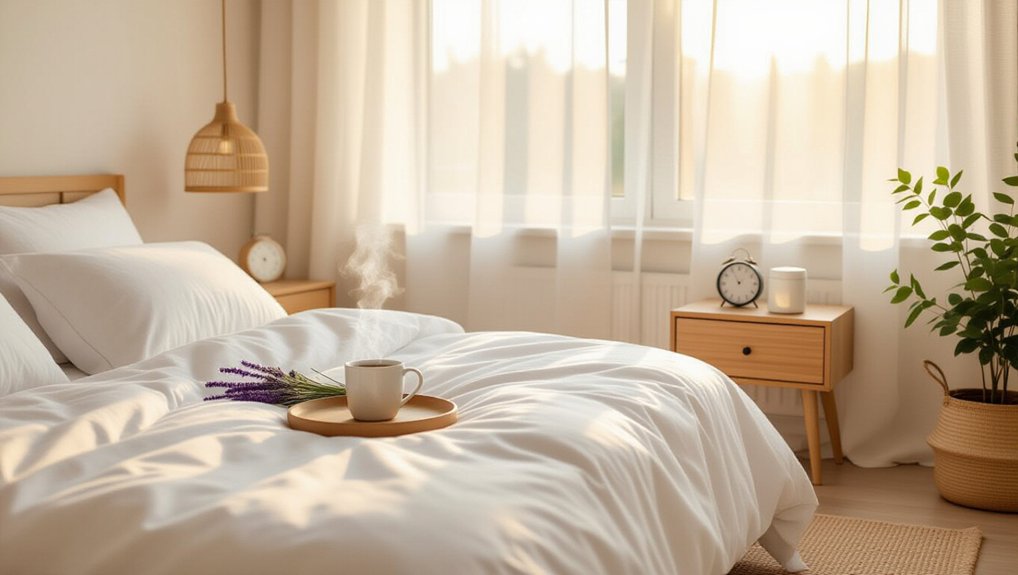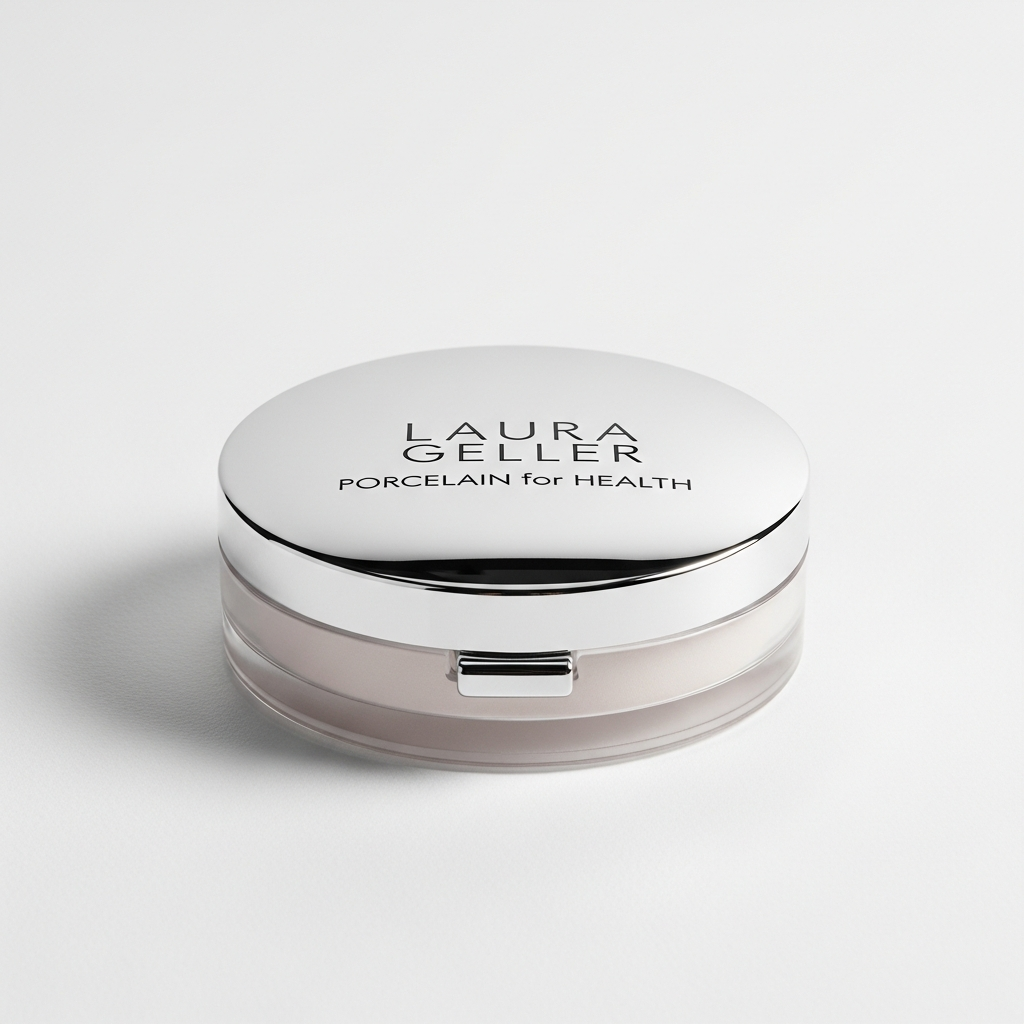You’ve probably tried counting sheep, drinking warm milk, or even expensive sleep aids, yet you’re still lying awake staring at the ceiling. The truth is, achieving quality sleep naturally doesn’t require complicated solutions or costly products—it’s about understanding how your body’s sleep mechanisms actually work and making targeted adjustments to your environment and habits. What you’ll discover might surprise you, especially when it comes to the timing of your daily activities.
Optimize Your Sleep Environment for Maximum Comfort
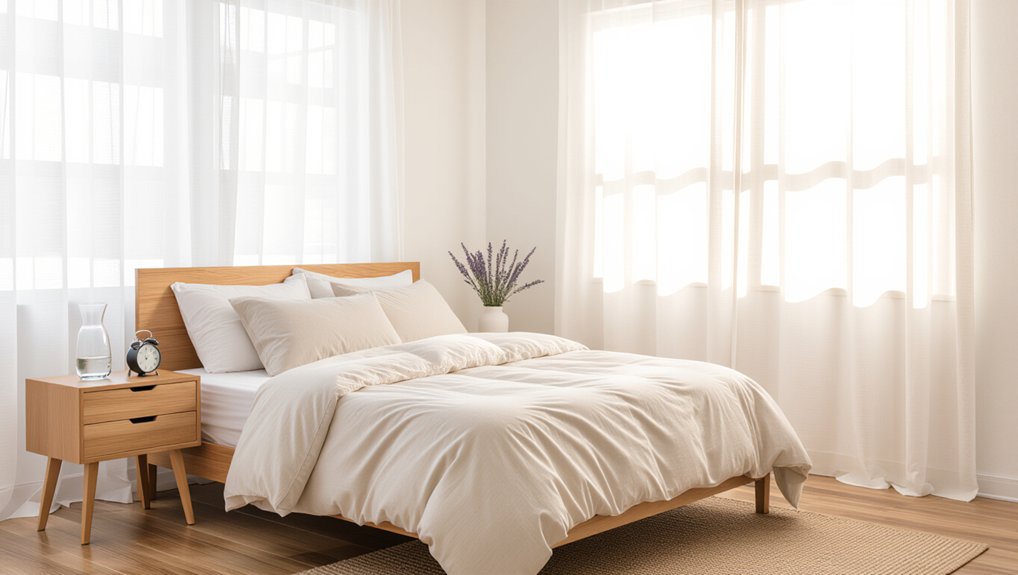
Your bedroom serves as the foundation for quality sleep, and creating the right environment can dramatically improve your rest.
Keep your room temperature between 60-67°F, as cooler temperatures signal your body to produce melatonin. Invest in blackout curtains or an eye mask to block disruptive light, which can interfere with your circadian rhythm.
Consider white noise machines or earplugs to minimize sound disturbances from traffic, neighbors, or household activity.
Choose a supportive mattress that aligns your spine and replace it every 7-10 years. Your pillow should maintain proper neck alignment based on your sleeping position.
Remove electronic devices like phones, tablets, and TVs from your bedroom, as blue light exposure can suppress melatonin production.
Finally, keep your space clutter-free and well-ventilated to promote relaxation and deeper sleep.
Establish a Consistent Bedtime Routine
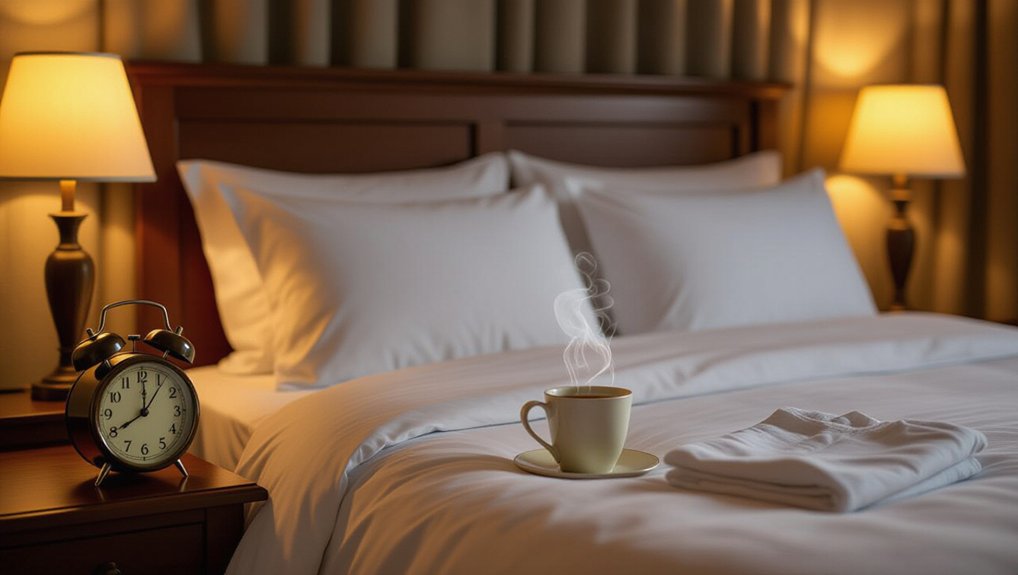
When you follow the same pre-sleep activities each night, you’ll train your brain to recognize bedtime signals and transition more easily into rest mode.
Start your routine 30-60 minutes before your target sleep time. Begin by dimming lights throughout your home to trigger natural melatonin production.
Choose calming activities like reading, gentle stretching, or taking a warm bath. The temperature drop after a warm shower naturally promotes drowsiness.
Write in a journal to clear your mind of tomorrow’s concerns, or practice deep breathing exercises.
Avoid screens during this time, as blue light interferes with sleep hormones. Keep your routine consistent, even on weekends.
Your body thrives on predictability, and this consistency will make falling asleep feel effortless over time.
Harness the Power of Natural Light and Darkness
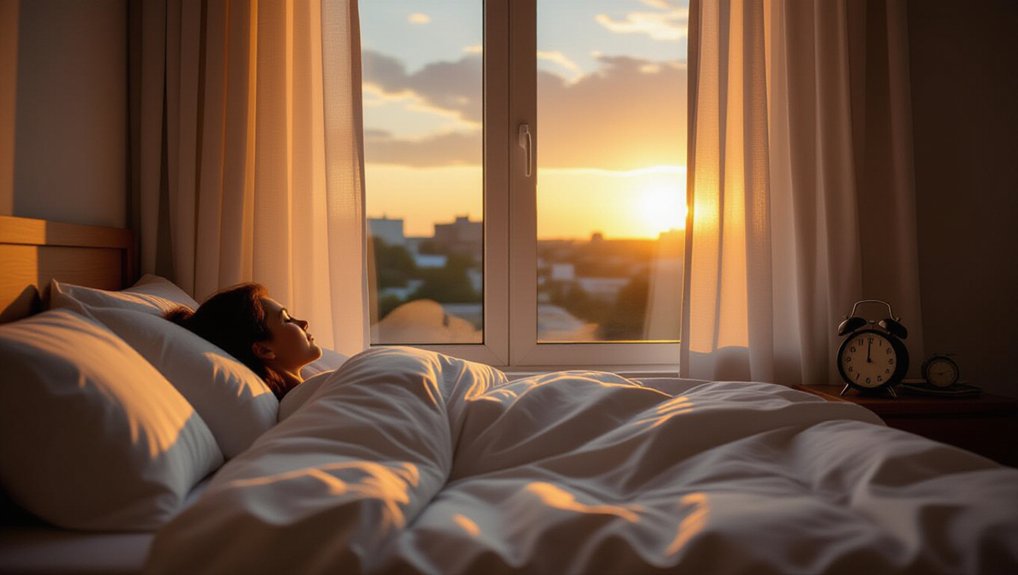
Light exposure acts as your body’s most powerful sleep regulator, directly controlling your circadian rhythm through specialized cells in your retina.
You’ll optimize your sleep-wake cycle by getting bright sunlight within the first hour of waking. This morning light exposure suppresses melatonin production and signals your brain to start the day.
Throughout the day, seek natural light whenever possible. Open blinds, work near windows, or take brief outdoor breaks.
As evening approaches, dim artificial lights and switch to warm, amber-toned bulbs. You should avoid blue light from screens two hours before bedtime, or use blue light blocking glasses.
Create complete darkness in your bedroom. Install blackout curtains, cover LED displays, and consider an eye mask.
This darkness triggers melatonin release, preparing your body for restorative sleep.
Choose Sleep-Promoting Foods and Timing

While your body naturally produces sleep-inducing chemicals, the foods you eat and when you consume them can significantly enhance or disrupt this process. You’ll sleep better by choosing foods rich in tryptophan, magnesium, and melatonin.
Turkey, almonds, cherries, and bananas promote relaxation and drowsiness. Avoid caffeine after 2 PM since it stays in your system for 6-8 hours.
Don’t consume large meals within three hours of bedtime, as digestion interferes with sleep quality. Instead, opt for a light snack combining protein and complex carbohydrates if you’re hungry.
Herbal teas like chamomile and passionflower can ease you into sleep mode. Time your last alcoholic drink at least four hours before bed, since alcohol fragments your sleep cycles.
Practice Relaxation Techniques Before Bed

Your mind and body need a clear transition from the day’s stress to restorative sleep, and relaxation techniques create this essential bridge.
Deep breathing exercises calm your nervous system by activating your body’s relaxation response. Try the 4-7-8 technique: inhale for four counts, hold for seven, then exhale for eight.
Progressive muscle relaxation works by tensing and releasing each muscle group, starting from your toes and working upward.
Meditation helps quiet racing thoughts that keep you awake. Even five minutes of mindfulness can make a difference.
Gentle stretching releases physical tension accumulated throughout the day.
You’ll find these techniques become more effective with consistent practice, so don’t expect immediate perfection.
Exercise at the Right Time for Better Sleep

Although exercise improves sleep quality significantly, timing determines whether it’ll help or hinder your rest. You’ll sleep better when you finish vigorous workouts at least three hours before bedtime. Late-evening exercise raises your core body temperature and increases alertness, making it harder to fall asleep.
Morning and afternoon workouts provide the greatest sleep benefits. They help regulate your circadian rhythm and reduce stress hormones like cortisol. If you must exercise in the evening, choose gentle activities like yoga, stretching, or walking.
You don’t need intense workouts to improve sleep. Just thirty minutes of moderate activity, such as brisk walking or swimming, can enhance sleep quality.
Consistency matters more than intensity—regular exercise trains your body’s natural sleep-wake cycle for deeper, more restorative rest.
Manage Stress and Racing Thoughts
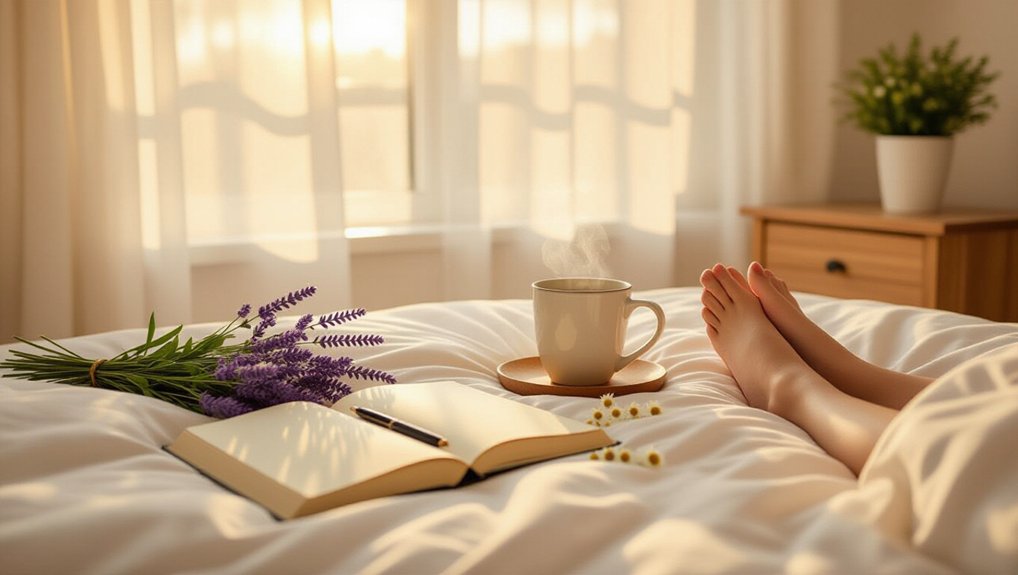
Racing thoughts and stress create one of the biggest barriers to falling asleep, as your mind replays the day’s events or worries about tomorrow’s challenges.
You can break this cycle by implementing specific calming techniques before bedtime.
Try the “brain dump” method: write down everything on your mind for five minutes, then close the notebook. This signals your brain to stop processing these thoughts.
Practice deep breathing exercises, inhaling for four counts, holding for four, and exhaling for six counts.
Progressive muscle relaxation works well too—tense and release each muscle group from your toes to your head.
Create a worry window earlier in the day to address concerns when you’re mentally sharp, not at bedtime when solutions feel impossible.
Use Herbal Remedies and Natural Supplements

Certain herbs and natural supplements can gently nudge your body toward sleep without the side effects of pharmaceutical sleep aids.
Chamomile tea contains apigenin, which binds to brain receptors that promote drowsiness. You can drink it 30-60 minutes before bed for optimal results.
Valerian root acts as a natural sedative, helping you fall asleep faster and achieve deeper sleep. Take 300-600mg about two hours before bedtime.
Magnesium regulates melatonin production and relaxes your muscles. Consider 200-400mg of magnesium glycinate in the evening.
Passionflower reduces anxiety and quiets mental chatter that keeps you awake.
L-theanine, found in green tea, promotes relaxation without drowsiness. Start with lower doses to assess your body’s response to any supplement.
Control Temperature and Air Quality in Your Bedroom
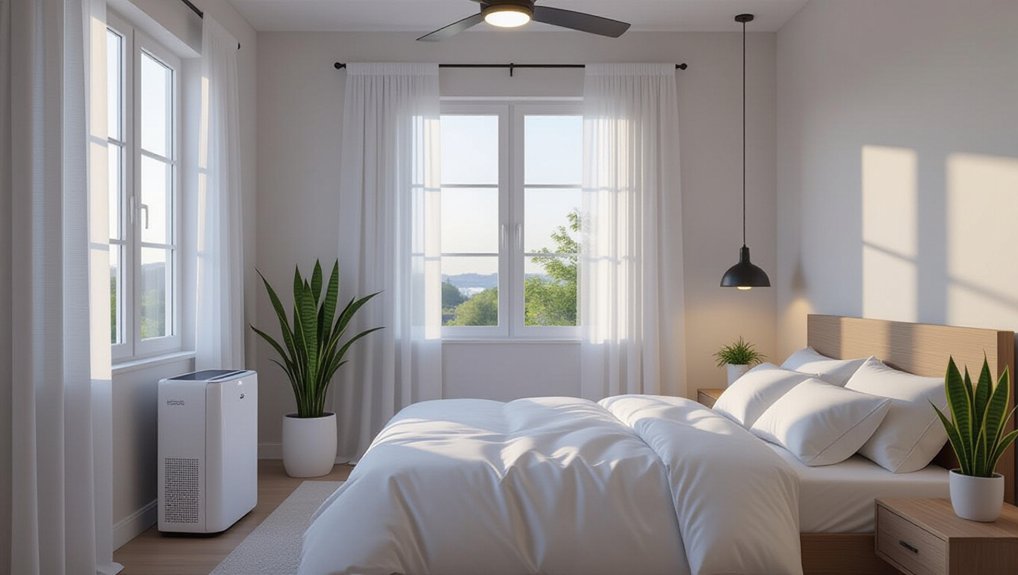
Your bedroom’s environment plays a crucial role in determining sleep quality, with temperature and air circulation being two of the most controllable factors.
Keep your room between 60-67°F for optimal sleep conditions. Your body naturally cools down before sleep, and a cooler environment supports this process.
Ensure proper ventilation by opening windows when weather permits or using a fan to circulate air. Poor air quality from dust, allergens, or stuffiness can disrupt breathing and sleep patterns.
Change your bedding weekly and vacuum regularly to reduce allergens.
Consider using an air purifier if you live in a polluted area or suffer from allergies. Humidity levels should stay between 30-50% to prevent dryness or excessive moisture that breeds mold and dust mites.
Break Habits That Sabotage Your Sleep Quality

While optimizing your bedroom environment sets the foundation for better sleep, many people unknowingly engage in daily habits that undermine their efforts.
You’re likely sabotaging your sleep quality without realizing it.
Late-afternoon caffeine consumption can keep you awake hours past bedtime. Cut off coffee, tea, and chocolate by 2 PM.
Screen time before bed disrupts your natural melatonin production—put devices away one hour before sleep.
Irregular sleep schedules confuse your circadian rhythm. Go to bed and wake up at consistent times, even on weekends.
Heavy meals within three hours of bedtime force your body to digest instead of rest.
Alcohol might make you drowsy initially, but it fragments your sleep cycles later.
Exercise timing matters too—intense workouts within four hours of bedtime can overstimulate your nervous system.
Conclusion
You’ve got the tools to transform your sleep naturally. Start implementing these strategies tonight—dim those lights, create your bedtime ritual, and prepare your environment for rest. Don’t try everything at once; pick two or three techniques that resonate with you first. Consistency beats perfection, so stick with your new habits even if you don’t see immediate results. Your body will thank you for prioritizing quality sleep without relying on artificial aids.
